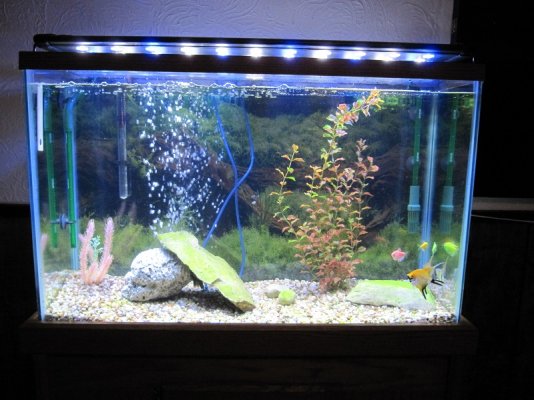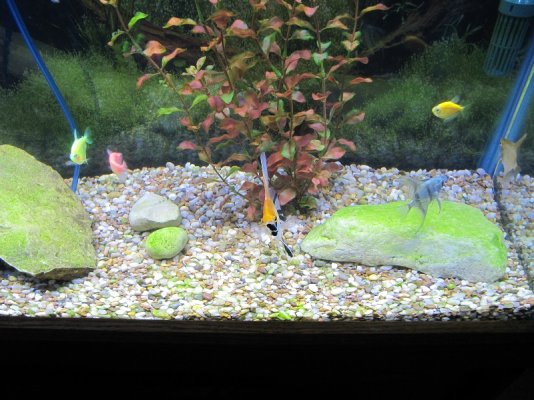Hello All! I'm new to the hobby and have a question or two.
I'm using a EVO LED light system on a 45 Gallon Tall Glass tank. W/ Eheim 2215 filter system and doing weekly water changes. The water being used is tanked water gathered from an Osmosis system designed for Aquariums. No live plants.
With my current set-up I have a good but a bad problem being your bright green Algae. I'm almost positive it's the light system as all other lighting is covered (Windows). As well as the nutrients in the water being so pure. And maybe because algae eater is a little lazy.
I believe the light is just too powerful.
32 x 10000Daylight
12 x Actinic
3W LED
36" overhead
With a complete water change and the rocks scrubbed to white again and all glass sides spot less this is the result in one week. Light is on timer for only 6 hours.
I have already read about live plants taking the nutrients cutting back on Algae but not interested in live plants.
Besides the obvious less light time. What Can I do to slow it down? The light is so bright you can't really see on the glass but it's there.
Are there external dimmers? Can I run a special filter in my canister? Do I use chemicals? How about raising the light? What about defuser's on the bulbs. Most would say what I have is a good thing. But I really don't like to deal with the algae on a weekly basis. Water changes are enough. I feel algae should be cleaned when you do a monthly major clean as I like to call it.
Is there links for Diffuser to my brand light that someone can provide.
Is there links to overhead light clamps to raise?
What would you do? Any help would be great! Thank you.
I'm using a EVO LED light system on a 45 Gallon Tall Glass tank. W/ Eheim 2215 filter system and doing weekly water changes. The water being used is tanked water gathered from an Osmosis system designed for Aquariums. No live plants.
With my current set-up I have a good but a bad problem being your bright green Algae. I'm almost positive it's the light system as all other lighting is covered (Windows). As well as the nutrients in the water being so pure. And maybe because algae eater is a little lazy.
I believe the light is just too powerful.
32 x 10000Daylight
12 x Actinic
3W LED
36" overhead
With a complete water change and the rocks scrubbed to white again and all glass sides spot less this is the result in one week. Light is on timer for only 6 hours.
I have already read about live plants taking the nutrients cutting back on Algae but not interested in live plants.
Besides the obvious less light time. What Can I do to slow it down? The light is so bright you can't really see on the glass but it's there.
Are there external dimmers? Can I run a special filter in my canister? Do I use chemicals? How about raising the light? What about defuser's on the bulbs. Most would say what I have is a good thing. But I really don't like to deal with the algae on a weekly basis. Water changes are enough. I feel algae should be cleaned when you do a monthly major clean as I like to call it.
Is there links for Diffuser to my brand light that someone can provide.
Is there links to overhead light clamps to raise?
What would you do? Any help would be great! Thank you.


